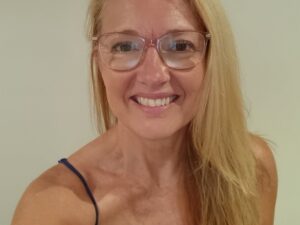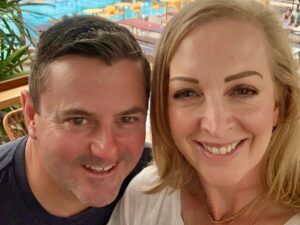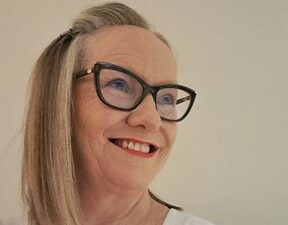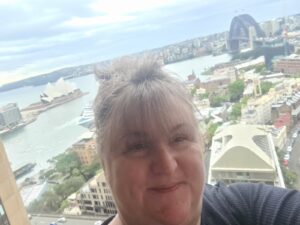I had been constipated for a number of years but used to take medication to ease the problem. I had had blood tests annually, recommended by my GP, but no major problems appeared.
In May 2017 I fell out of a tree and was taken to hospital. Full body scans revealed the extent of the damage to my whole body plus a spot on my liver. I was not made aware of the spot on my liver until I visited my GP a month later. He informed me “that it was nothing to worry about and he would send me for further blood tests later”. I began to experienced flushing in July and purchased green makeup to cover the redness and I went back to teaching 3 months later.
By the end of 2017 I caught, what I thought was a virus and experienced stomach cramps and constipation. I presented 3x’s to my GP who provided scripts for further medication. I presented to Fiona Stanley Hospital (FSH) twice and on the second visit I had an x-ray and was to be released. My friend advocated for me insisting that there was something more than constipation wrong with me. A CT scan was done and I was told I had bowel cancer. Emotions kicked in and I thought I was going to die. NO SUPPORT was provided nor recommended by the health system (FSH) at that time.
I was admitted to FSH and my friend (advocate) had to inform the nursing staff that I was upset, worried and very scared as I had just been diagnosed with bowel cancer. One nurse came and took vitals but nothing was said re my emotional state. I sat up all night looking out of the window. Further testing was done under a wonderful surgeon who, advised me that he had more questions than answers. I required a PET scan and went private (cost $900+ and no claim could be made from Medicare nor from my private health fund) as I would have had to wait nearly a month to attain the scan from FSH. Results returned and the surgeon informed me I had Carcinoid cancer.
I was released and then readmitted two weeks later to FSH for a colonoscopy which revealed nothing. I ended up having a laparotomy and the report stated a large mesenteric mass: thus, resection of small bowel/lymph nodes etc. I was released a week later with many medications and was told Renae, the Cancer Nurse would ring to ensure all was going well. I DID NOT receive any follow up from the Cancer Nurse nor offered any emotional help from the hospital so I consulted my GP – up to 3x’s per week as I was emotionally distraught and I experienced infections, nausea, constant diarrhoea and pain. These visits did become very expensive.
Three months later I had an appointment with the NET oncologist who did not answer my many questions but gave me a Unicorn pamphlet and said “You are a teacher and intelligent so research information about your cancer and I will see you in a month”.
My saving grace was the forum held at FSH where I met a woman who had NETS and was still alive 8 years later! I listened to the many ‘ists’ during the forum and it was then I knew that I was going to have to ‘drive my own journey’.
I downloaded the patient book and read it cover to cover and began my learning. Through reading this I was able, two months later, to know that the pain on my right side was the ‘spot on my liver’. I consulted my GP and showed her the bloods I needed to have and they revealed inconsistencies. I advocated for myself and gave the GP the phone number to contact FSH to arrange another oncologist visit. The oncologist put me on Sandostatin.
Through attending NET meetings at FSH I was made more aware of NETS and found friendship and understanding from all who attended plus I had found a ‘home’ where others understood. It was the platform where I could associate with survivors with much information to share and they are always an invaluable resource.
I was made aware of the MDT at FSH, through the patient book. However, fear again set in when I received an ‘out of the blue’ phone call stating I needed to present to FSH for a Cat Scan. I had to ask the clinician what was I there for – an inconsistent finding regarding my kidney. This again, I find, absolutely deplorable because it added further emotional stress and I was unable to ask the oncologist what was happening to me until 3 months later at my next appointment.
The system needs to be improved for all NET patients in WA including from the Cancer Council of WA. Access needs and must be made available for support and assurance that if a patient who is experiencing eg symptoms/in pain is thus able to make an appointment that perhaps is not the regular 3 monthly timing and for psychological help which most patients require at some point within their journey. Regular results for scans and blood tests should not be left up to the patient to attain but supplied by oncologists at appointments. Again, I had to advocate for myself to attain records and I applied for and received ‘Freedom of Information” plus doctor’s notes to begin to understand what was happening to me. I also sought out where I was able to attain blood tests results within FSH.
Looking back, especially emotionally, there was no support provided for me at any point of my diagnosis nor my first visits to the oncologist. I learned very quickly that I had to advocate for myself, research for myself and find solutions to the problems I faced in the early stages of my journey eg diet, pain, fear and acceptance. These areas of need must be solved.
I do feel empowered now as I advocate for myself and I am much stronger with knowledge, through research, and from friends I have met through NET meetings. I do now have a NET oncologist to whom I am able to ask questions. I have found ‘the way’ to get into see my oncologist and found specific phone numbers as required eg liason officer, appointment line and scan line if required.
I certainly find that it is exceptionally abhorrent and extremely sad that patients have to continually advocate for each other within the whole Health System in WA. The fear factor is prevalent within us all and that is often the basis of all phone calls patients make to each other.
A lighter note is that I now focus on the positives, for example my NETS was found at age 67 and I haven’t had to experience the ‘7 doctors 7 diagnosis’ reality so many patients have had to experience. I set myself goals and celebrate their attainment and I have accepted that this cancer is going to live with me but will not define me.
Neuroendocrine Cancer Australia, thank you for all that you do.
Doreen.





